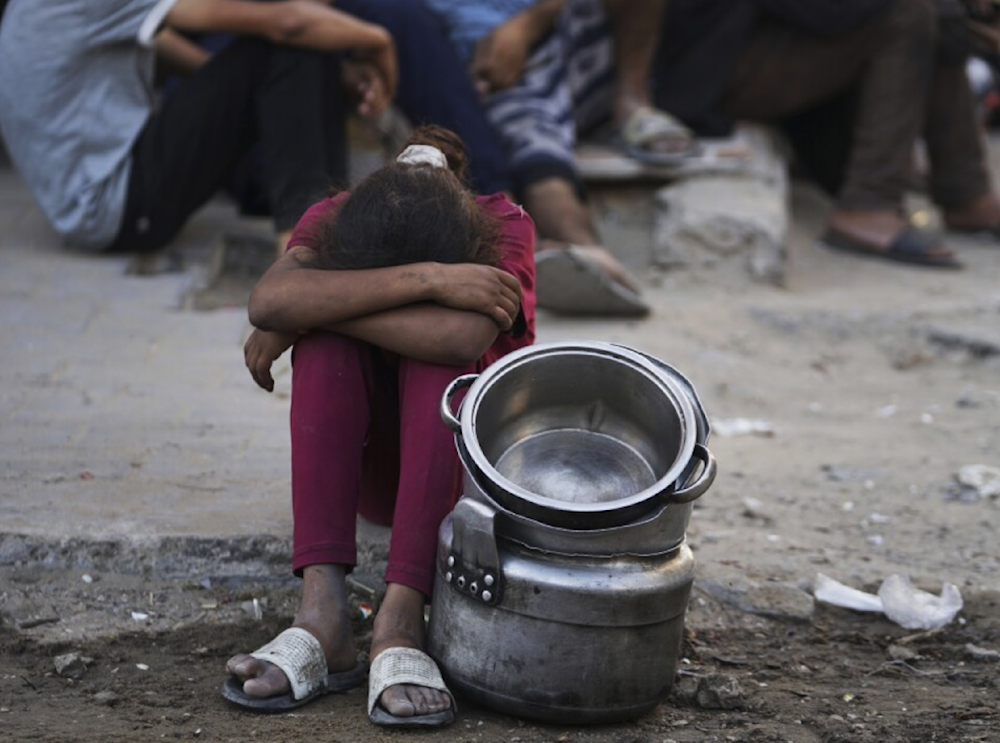Global calls for ceasefire fall flat amid Gaza devastation: WashPo
The aggression and suffering in Gaza show no signs of abating, as "Israel" continues airstrikes across the region.
-

A Palestinian child waits in Gaza to receive pre-cooked meals distributed by a charity kitchen on July 16, 2025. (AP)
After an Israeli airstrike hit Gaza’s only Catholic church, Pope Leo XIV called for an "immediate ceasefire" in Gaza. The strike killed 3 Palestinians and injured 10 others as Israeli authorities blamed “stray munitions".
The Pope expressed sorrow for the losses suffered by Gaza’s small Christian community and urged for “dialogue and reconciliation,” as ceasefire negotiations between "Israel", Hamas, and international mediators continue.
The aggression and suffering in Gaza show no signs of abating, as "Israel" continues airstrikes across the region. This includes a bombing campaign in Syria this week, which "Israel" claims is to protect the Druze minority from sectarian attacks.
Beyond the battlefields of the Middle East, "Israel" faces other confrontations. Judges at the International Criminal Court (ICC) in The Hague rejected "Israel’s" request to withdraw arrest warrants against Prime Minister Benjamin Netanyahu and former Security Minister Yoav Gallant. In response, the US imposed sanctions on some ICC judges and prosecutors in an attempt to pressure the court.
'Israel' avoids punitive measures, dismaying human rights advocates
Earlier this week, Israeli Foreign Minister Gideon Saar traveled to Brussels to meet with European counterparts. He emerged, in his words, victorious, having secured “an important diplomatic feat” by persuading the European Union to avoid punitive measures against "Israel."
However, human rights advocates were dismayed, given the scale of the humanitarian crisis in Gaza and "Israel’s" documented obstruction of aid into the devastated strip. Agnès Callamard of Amnesty International called the EU’s stance “remembered as one of the most disgraceful moments in the EU’s history” and “a cruel and unlawful betrayal of the European project and vision.”
Ireland, Spain, and Slovenia
Ireland, Spain, and Slovenia are the only EU states to openly criticize "Israel" and lead accountability efforts in Brussels. These nations are taking independent steps to denounce "Israel’s" wartime conduct.
Spanish Prime Minister Pedro Sanchez accused Israel of “genocide” earlier this month. Irish lawmakers are pursuing legislation to ban trade with Israeli settlements in the occupied West Bank, sparking anger among some US officials.
Slovenia declared two far-right Israeli ministers persona non grata, barring their entry, with Slovenian Foreign Minister Tanja Fajon saying, “This kind of measure is the first of its kind in the European Union.”
“We are breaking new ground.”
vs. UK, France, and Germany
Skepticism surrounds how effective small nations’ efforts really are, according to The Washington Post. Within Europe, the UK, France, and Germany continue to avoid directly challenging "Israel", while Emmanuel Macron’s push to reignite global momentum for Palestinian statehood appears to be losing steam.
Meanwhile, supporters of "Israel" in the US remain unfazed. As veteran Washington analyst Robert D. Kaplan put it, “An unstated reason for Europe’s particular animus toward Israel over the decades is that the continent’s leaders secretly resent Israel’s willingness and ability to regularly defend itself through tough military action… something Europe’s elites never had even to countenance, and arguably couldn’t manage.”
Kaplan and those who share his views were likely unmoved by a summit held earlier this week in Bogota, where representatives from 30 nations gathered to urge "Israel" to halt its aggression on Gaza and its occupation of the West Bank. The event, organized by The Hague Group and co-hosted by South Africa, currently spearheading a genocide case against "Israel" at the ICJ, and Colombia’s leftist government, wrapped up on Wednesday with 12 countries committing to new actions to “restrain” "Israel". These included stopping arms sales to the entity, blocking arms shipments by sea, and reassessing public contracts involving firms tied to Israeli settlements.
Prelude to global shift
Looking at the list of early signatories, Bolivia, Colombia, Cuba, Indonesia, Iraq, Libya, Malaysia, Namibia, Nicaragua, Oman, Saint Vincent and the Grenadines, and South Africa, The Washington Post concludes that it’s clear that "Israel’s" leadership is unlikely to feel deeply threatened. Nevertheless, advocates of the summit argued it marked the first step in a global shift.
“For too long, governments have been too afraid of the consequences of angering the United States to risk taking action to uphold international law,” said Annelle Sheline, a former US State Department official who participated in the Bogotá summit. “This is about more than Israel and Palestine, this is about a new multilateralism taking shape to replace the old system.”

 4 Min Read
4 Min Read










